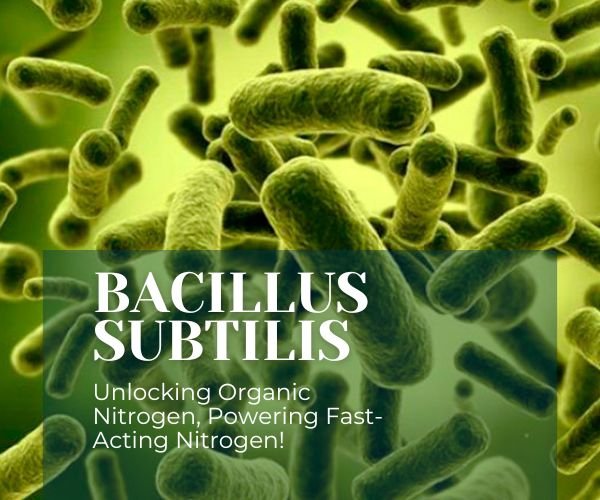In modern agriculture, organic nitrogen from crop residues, manure, or compost plays a key role in soil fertility—but most of it exists in complex, large molecular forms that plants cannot directly absorb.
Here comes Bacillus subtilis, the “pioneer microorganism” that initiates the transformation of organic nitrogen into plant-available, fast-acting nitrogen.
1. The Core Function of Bacillus Subtilis — Cutting the Protein Chains
Bacillus subtilis secretes powerful proteases, enzymes that act like “molecular scissors.”
These enzymes target proteins—the main nitrogen carriers in organic matter—breaking the long peptide chains into smaller, absorbable units:
Protein → Proteose → Peptide → Amino acid
This process is like turning a string of beads (complex protein) into single beads (amino acids).
The result: nitrogen that was once locked inside insoluble organic matter becomes bioavailable to plants and soil microbes.
2. Paving the Way for Ammonification — The Birth of Fast-Acting Nitrogen
While Bacillus subtilis doesn’t perform ammonification directly, it plays a crucial preparatory role.
Once it releases amino acids from proteins, ammonifying bacteria (such as Escherichia coli and Proteus spp.) take over—removing amino groups (-NH₂) and forming ammonium (NH₄⁺), the first form of nitrogen that plants can absorb immediately.
The more efficiently it breaks down organic nitrogen, the more raw material is available for this conversion, leading to higher levels of plant-available ammonium nitrogen.
3. Strong Environmental Adaptability — Works in Various Conditions
One reason Bacillus subtilis is so valuable in agriculture is its remarkable resilience:
- Thrives in both aerobic and mildly anaerobic conditions
- Active across a wide temperature range (10–40°C)
- Performs well under soil pH 5.5–8.5
This adaptability allows it to keep working even in early spring or late autumn when soil temperature and pH fluctuate—maintaining continuous nitrogen transformation activity.
In Summary
Bacillus subtilis acts as the “primary processor” in organic nitrogen conversion.
It breaks down complex proteins into amino acids, laying the foundation for the formation of fast-acting nitrogen (NH₄⁺-N).
If we compare nitrogen transformation to making steamed bread from wheat:
- Bacillus subtilis is the “mill” that grinds the hard wheat (proteins) into flour (amino acids).
- Ammonifying and nitrifying bacteria are the “chefs” who turn flour into bread (fast-acting nitrogen).
Practical Application of Bacillus Subtilis
Incorporating Bacillus subtilis into soil—through fertilizer blending, root irrigation, or organic composting—can:
- Accelerate decomposition of straw and manure
- Enhance nitrogen conversion efficiency
- Improve nutrient availability and soil vitality
- Support sustainable and efficient crop production
Especially in soils rich in organic fertilizers (e.g., greenhouses and orchards), this microbial powerhouse ensures that nitrogen resources are released faster and utilized better.
WELLYOU TECH — Natural Power for Productive Soil
Empowering agriculture with microbial innovation and nutrient efficiency.


